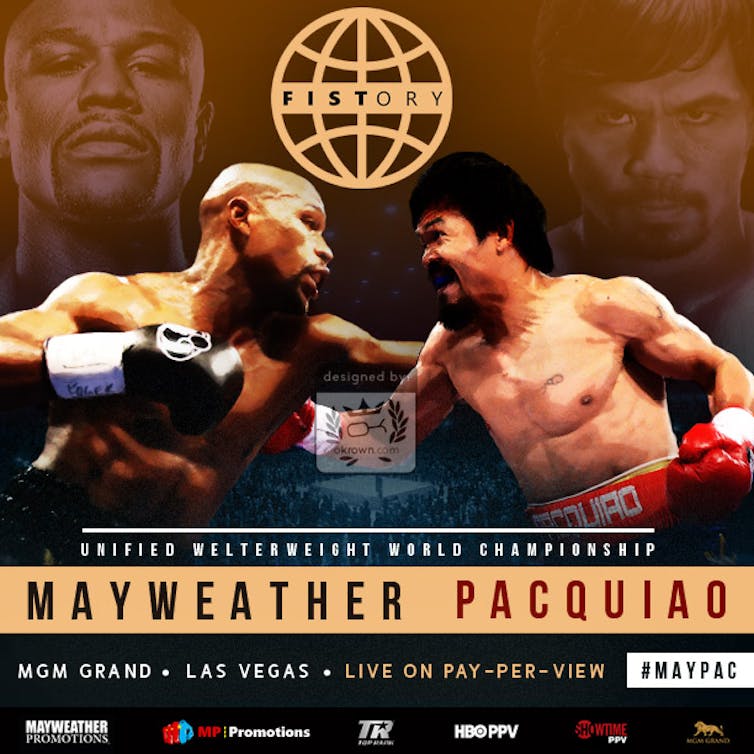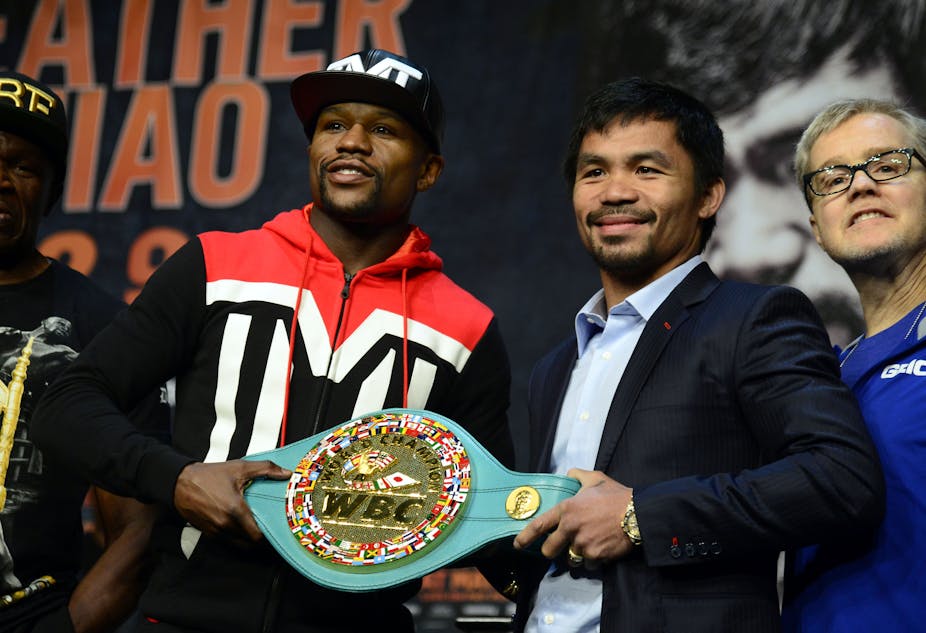When Floyd Mayweather and Manny Pacquiao meet at the MGM Grand in Las Vegas for their long-awaited fight on May 2, it is expected to be the highest grossing boxing match in history. Revenue from the fight is tipped to reach a record US$400m. Here are seven reasons why:
1. Boxing is a money-making sport
Boxing’s first million-dollar fight took place way back in July 1921. It was between American Jack Dempsey and Frenchman Georges Carpentier in Jersey City and the stands built for 91,000 were packed to capacity.
Since then, boxing matches have continued to generate huge sums of money, especially since 1990; ten fights have generated more than US$60m. Tickets for the fight start at US$1,500 – and 1,000 of the best seats have been sold for US$10,000. Most of the money will come from pay-per-view TV sales; viewers are paying US$99.99 to watch it at home in high definition.
2. General growth in audiences
All the major sporting events have generated their best audiences during the last decade.
The 2012 Olympic Games became the most watched event in US television history – nearly 220m Americans tuned in over its 17 days. This is largely a result of the American TV lobby’s power to dictate when certain events were held so that they could be broadcast live during prime time in the US.
In 2014 the FIFA World Cup became the most-watched sporting event in TV history reaching a cumulative TV audience of 3.5 billion viewers. And in 2015, Super Bowl XLIX became the most-watched show in US history, attracting 114.4m viewers.
So the media context for sport in general favours the economic success of the Mayweather-Pacquiao fight. As with the Superbowl, boxing is not just about the sport itself, but the performance and pageantry around it – which, fans say – gives it a particular entertainment focus.
3. Two big names
Floyd Mayweather and Manny Pacquiao are two of the best fighters and best-known of the past 15 years. Their fighting skills are indisputable. Mayweather is undefeated as a professional and is a five-division world champion. Pacquiao has been defeated five times, but he is the only eight-division world champion.
The two boxers are perhaps not at their peak. Before 2010, Mayweather won 25 out of his 40 fights by knocking his opponent out. Since 2010 he has “only” won one of his seven fights by knock-out. Pacquiao, meanwhile, has lost two of his last five fights compared to losing just three out of the 59 previous ones. But they remain two very competitive boxers and two of the biggest names in the industry.

4. It’s the first time they’ve met
In economics, scarcity is a major factor that explains product value. Mayweather and Pacquiao have never fought each other and it is very unlikely that they will ever fight again after Saturday, as Mayweather intends to retire after one more fight in September.
This is a specific characteristic of boxing compared to other competitive sports: in football, Barcelona play Real Madrid at least twice a year and often more; in tennis there is a set timetable of tournaments throughout the year. Boxing matches take place on a far more ad hoc basis and this could be the only time Mayweather and Pacquiao face each other in their entire careers.
5. A long-awaited fight
Apple is known for its successful communication strategy with its iPhones. It is based on creating customer expectation with no information on the possible launch date before the very end of the process. Similarly, the long lead time in the build-up to this fight has generated huge amounts of customer expectation due to the uncertainty surrounding it.
The fight has been talked about since 2009. Six years later, after much negotiating, the expectation among boxing fans is extremely high.
6. Media hype
The media plays a significant role in strengthening the perceived importance of the fight for people. To do so, it relies on the reasons evoked above. They also stress the opposition between the two boxers; Mayweather is reported as only being interested in the purse while Pacquiao is portrayed as very much a man of the people and a national treasure for the Philippines. The American TV network, Showtime, has produced the four-part “Inside Mayweather vs. Pacquiao”, a documentary-style series leading up to and covering the fight.
7. Uncertain outcome
Last but not least, the fight is worth so much due to its uncertainty of outcome. This has been the core element in the economics of professional sport since the first being studied by Simon Rottenberg in 1956 and Walter Neale in 1964. The latter presented the Louis-Schmelling paradox, based on an example from boxing.
African American Joe Louis won all of his first 27 fights, but unexpectedly lost his 28th against German Max Schmeling in 1936. While public had lost interest in Louis’ fights before his defeat (meaning less revenues for Louis), the fact that he was not perceived as invincible anymore revived interest in him. Ironically this led to a rise in his earning power.
Promoters capitalised on this when setting up a revenge fight between Louis and Schmeling. It was won by Louis with a knock-out in just two minutes and four seconds – hopefully after all the hype (and cost), the Mayweather-Pacquiao fight on Saturday will last a little longer.

